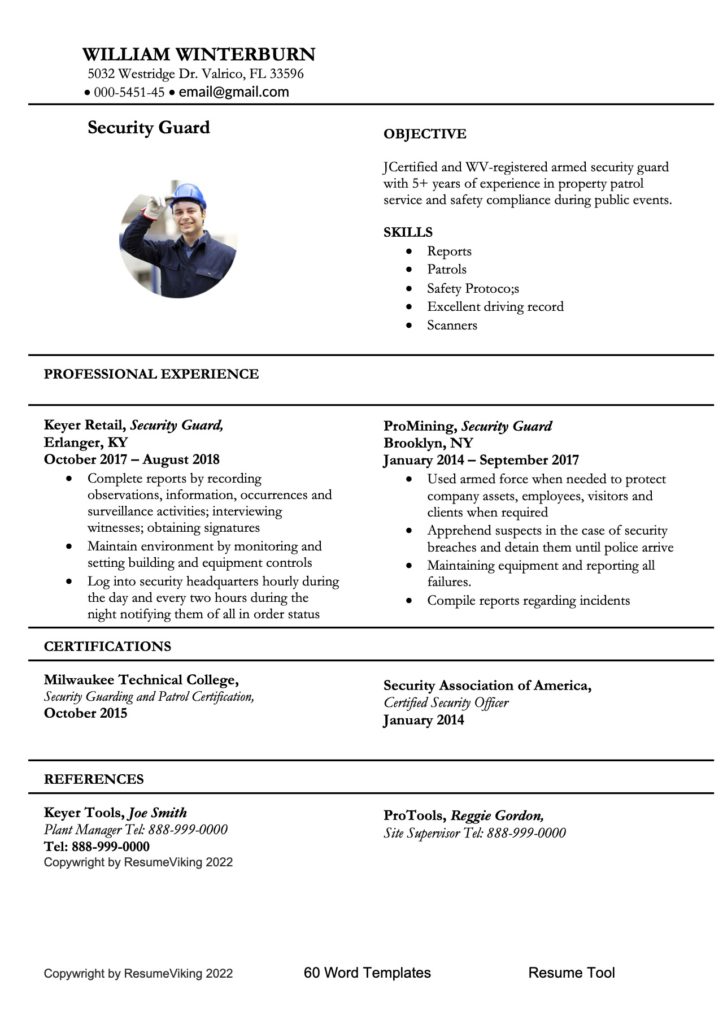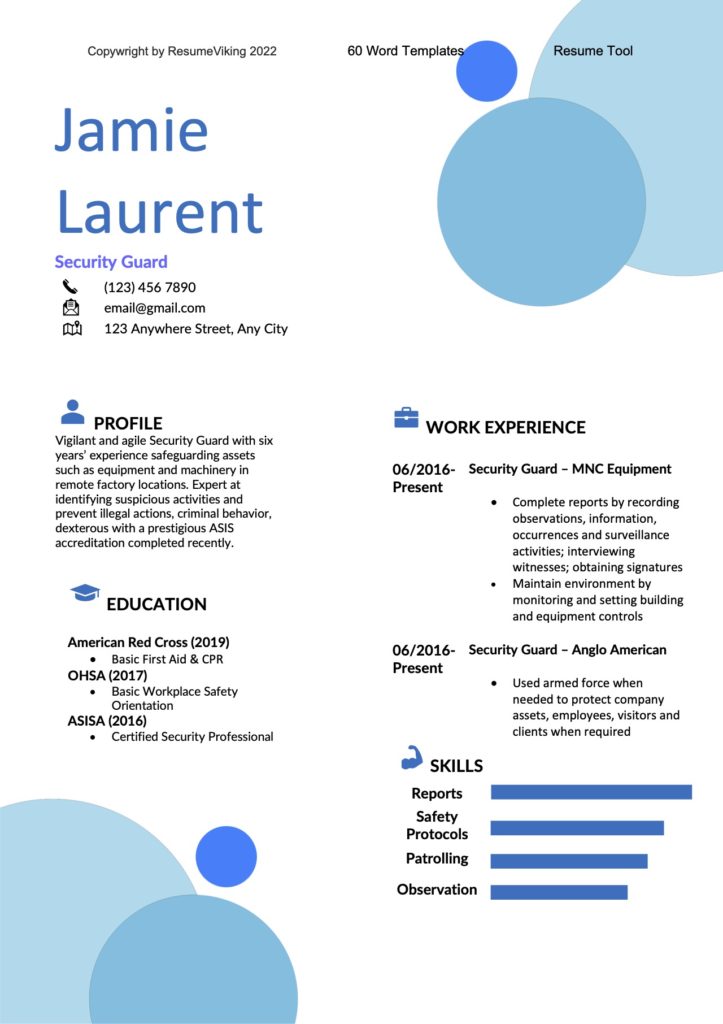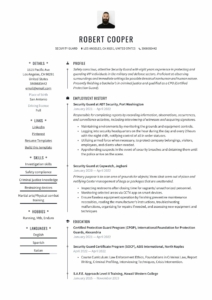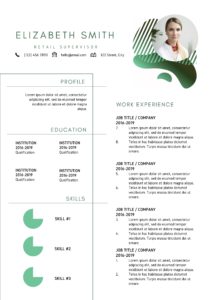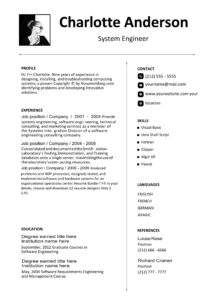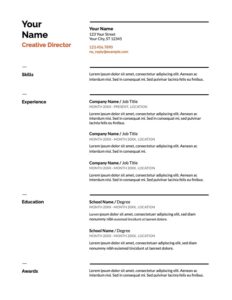Welcome to our “How-To” guide. When looking for your next (or first!) Security Guard job, we completely understand that it can be super frustrating trying to fit in all the info you think you need, or maybe you just don’t even know where to start.
We got your back, though, as our guide has everything you need (info, security guard resume examples, and tips) to ensure you have a polished, kick-ass resume to make your Security Guard application shine.
What you can read in this article
Security Guard Resume Examples
(Free sample downloads are at the bottom of this page)
Security Guard Resume Writing Guide
Resume Sections:
- Contact information
- Profile Summary
- Employment History
- Accomplishments
- Education
- Skill Section
- Certification & Licensing
- Extras: Languages/Awards/Publications/Volunteering/hobbies
- > Professional information
What to Highlight as Security Guard
Security Guards make sure to keep company assets, environments, and property free of any crime. While this is the gist of the whole thing, to grab the recruiters' attention, you’ll need to showcase many technical skills and aspects in your resume as well.
1. Describe the kind of setting you have worked in. You may have been working in a secured estate, a corporate company, or maybe you’re one of the big boys working at a federal agency/ government agency protecting VIPs. Don’t make the recruiter have to guess, be concise.
2. Highlight everything you did/ are doing in your role. For example, you could have had a more passive role watching CCTV cameras or a more active role, walking around and monitoring/ scanning the environment, making sure everyone in the area is safe.
3. Explain your duties and the procedures you followed if an issue happens. For example, what steps did you follow when the alarm went off? Were you only supposed to notify someone, or were you supposed to engage and investigate? Some security guards must report to third parties like the police. In other instances, you may be responsible for making statements, documenting what happened, and reporting to your superior.
4. You must definitely include the KPIs you needed to adhere to. Things like checking windows, doors, gates, etc., after everyone has left the workplace. You must also keep logs during your shift and prepare reports of minor/ major incidents.
5. Highlight your communication and interpersonal skills when you must administer warnings after confronting trespassers or loiterers. Even employees, when they break a rule, explain why they shouldn’t be doing that particular action. Conflict management is a critical skill in this profession.
6. Indicate the lengths of shifts you did in the past, and the type of shift, such as night/ day shifts. Also, include if you’re willing to work holidays/ weekends.
7. If you hold a more managerial position, supervising other security guards, you must specify this and to the extent, your roles differed from that of a standard security guard.
1. Contact information
- First & Last Name
- Physical Address
- Driver's license (optional)
2. Profile & Summary
Your career summary/ objective is literally the make-or-break for your resume. The recruiters won’t read further if this section isn’t shiny enough, so let’s chat about how we can catch their eye instantly.
The hiring manager in this business is basically always busy. You need to make sure he takes a little more time to read your resume further. This is done with the career summary/ objective. It highlights your entire resume in 4-6 sentences, and this is how the recruiter decides if you land in the “yes” pile.
Which one do you write, though?
- If you have many years under the industry belt, write a career summary.
- If you are very little/ no working experience in the industry, write up an objective.
The summary sums up your experience and skills. The objective focused on your career goals and how you plan to add value to the team. Follow the four steps below for the correct format:
- Step 1 – Begin with a strong adjective that describes your character.
- Step 2 – Provide the industry setting and years of experience.
- Step 3 – Include 1 or 2 notable proficiencies.
- Step 4 – End off with your highest qualification/ accreditation/ credential.
Examples
Security Guard Summary 1
“Safety conscious, attentive Security Guard with eight years experience in protecting and guarding VIP individuals in the military and defense sectors. Proficient at observing surroundings and immediate settings for possible threats of nonhuman and human nature. Presently, finishing a bachelor’s in criminal justice and qualified as a CPO (Certified Protection Guard).”
Security Guard Summary 2
“Alert and responsive Security Guard with 6+ years of experience safeguarding assets, including machinery and equipment, in isolated mining locations. Professional at recognizing suspicious activities and preventing illegal actions, criminal behavior, and physical rupturing of electric fences around the grounds. Physically fit and nimble with a prestigious ASIS accreditation completed recently.”
Security Guard Summary 3
“Unarmed security guard looking to apply patrolling skills and customer service at ABC. Delivered security service during five open-air concerts. Defusing several tense interactions between audience members. Attained security training during a temporary position at a 24-hour pharmacy store.”
Security Guard Summary 4
“Qualified and WV-registered armed security guard with 7+ years experience in property patrol service and safety compliance during public events. During my previous role with the MSA Security at Grand State Offices, I reduced safety incidents by 54% and confirmed no material loss. Looking to apply my problem-solving skills to offer crime prevention practices due to brilliant knowledge of security systems.”
3. Employment History
For this section, formatting is important. The best format is generally the reverse-chronological format. You must put your latest job first and work backward from there. It is easy to read, relevant, and Applicant Tracking Software (ATS) compatible (which means the scanning system your resume will go through before anyone sees it with human eyes won’t chuck it in the “no” pile).
Recruiters like this format as it makes their research easier.
If you’re creating a resume with little/ no security guard experience, just make the best of whatever you have done thus far, highlighting your transferable skills.
*Pro Tip: If this is your first job, you must be over 18 years old and have a criminal background check ready as well.
Examples:
Security Guard at ADT
January 2012- December 2016
Responsible for completing reports by recording information, observations, occurrences, and surveillance activities, including interviewing of witnesses and acquiring signatures.
- Maintaining environments by monitoring the grounds and equipment controls.
- Logging into security headquarters on the hour during the day and every 2 hours with the night shift, notifying control of all in order statuses.
- Utilizing armed force when necessary, to protect company belongings, visitors, employees, and clients when needed.
- Apprehending suspects in the event of security breaches and detaining them until the police arrive on the scene.
Security Guard at Copwatch
March 2018- March 2020
Primary purpose is to scan the area of grounds for objects/ items that seem out of place and notify Center management of bags or packages that are unattended.
- Inspecting restrooms after closing time for vagrants/ unauthorized personnel.
- Monitoring selected areas via CCTV app on smart devices.
- Ensure flawless equipment operation by finishing preventive maintenance necessities, reading the manufacturer's instructions, troubleshooting malfunctions, organizing for repairs if needed, and assessing new equipment and techniques.
Job Descriptions Examples
If you need help with this section, we split job descriptions into their industries to help you create your own list.
A Security Guard at a Shopping Centre/Mall:
- Providing physical security, emergency response, and access control to employees and customers.
- Patrolling parking lots below ground and on upper levels, reporting any suspicious activities to Center Management.
- Monitoring incoming/ outgoing vehicles, and doing surprise inspections of the vehicles.
- Scanning area premises for any objects and/or items that seem out of place, notifying Center management of bags/ packages that are unattended.
- Inspecting restrooms after closing time for any vagrants/ unauthorized people.
- Monitoring selected areas via CCTV app on smartphones/ devices.
- Reporting safety concerns/ strange circumstances to the Head of Security.
- Logging events/ confrontations as per employer procedures.
- Handling emergencies/ security problems following preset rules of conduct outlined in the safety and security manual.
An Armed Security Guard at an Industrial Facility:
- Performing identification checks/ vehicle searches for every client and employee entering the premises.
- Protect clients, employees, and visitors with correct inspecting techniques.
- Providing directions/ assistance to visitors, notifying the front desk reception they are on their way.
- Responding to emergencies that involve buildings/ people, while adhering to safety protocols conducted of the company.
- Conducting consistent foot patrols around the grounds at night, looking for unlocked doors, open windows, and unauthorized activity.
- Logging into security headquarters on the hour during the day and every 2 hours with the night shift, notifying control of all in-order statuses.
- Utilizing armed force when required to protect company assets, visitors and clients, and employees.
- Apprehending suspects in the event of security breaches and detaining them until the police arrive on the scene.
A Security Guard at a Hospital/Medical Institution:
- Providing security services to patients, staff, and visitors, guaranteeing the safety of all individuals and hospital belongings.
- Meticulously scanning selected areas for unauthorized access, like medical equipment and drug storerooms.
- Relieving the front desk staff at nighttimes, checking identification, and signing in and out of visitors.
- Conducting foot patrols every hour inside the hospital, checking restrooms, corridors, and wards for anything suspicious or unattended items.
- Initiating emergency/ security procedures when rule violations/ safety breaches/ incidents like bomb or fire threats happen.
- Ensuring that patients, visitors, and employees obey safety and security regulations at all times and administer warnings when required.
- Conducting vulnerability/ risk assessments and reporting problematic areas to the hospital’s facility manager.
A Hotel Security Guard:
- Attending to guest’s worries and complaints concerning damages/ theft and conducting appropriate incident investigations.
- Preparing comprehensive reports for Hotel Management concerning safety and security occurrences.
- Ensuring guests sign the attendance register when they arrive and give them access cards.
- Signing departing guests out of the grounds and collecting their access cards.
- Investigating events and preparing comprehensive reports concerning results.
- Managing risky occurrences and emergencies that follow hotel procedures.
- Conducting regular foot patrols around the hotel grounds, looking for possible violations, suspicious activities, or crimes.
- Reporting possible threats/ unsafe conditions to Hotel Management.
- Notifying police and management of criminal activities or emergencies.
4. Accomplishments
Ladies and gents. DO NOT copy and paste your job duties into this section, thinking you just outsmarted the system here. The only person you’ll outsmart is yourself. If you do that, recruiters won’t be able to read about the value you gave to your previous job.
Your goal is basically to think of things that set you apart from the next applicant.
Accomplishment statements are those prized outcomes you instigated from performing your responsibilities well. Think of your proudest moments, wow factors, results, and positive impacts that benefited your company, your co-workers, and its customers.
Quantify your resume:
- You absolutely have to back up your accomplishment statements with numbers. In other words, quantify them. Nothing makes a statement look good like a percentage/ time frame/ dollar amount etc.
Quantified Accomplishment Statements:
- Decreased theft of hotel items like linen, towels, décor pieces, and cutlery by 73% by improving vigilance strategies, particularly for guests leaving the hotel.
- Enhancing detection/monitoring procedures by having 15 360 degrees CCTV cameras installed at the back of shopping aisles and in storerooms, which cut product stock theft by 93%.
- Introduced inventive loss prevention techniques by installing an X-ray scanning system at every entrance and exit in the building, which reduced theft by 28%.
- Improved access control, which reduced unauthorized entry and solicitation by 26% using an announcement notification app, where visitors may be admitted/ declined entry straight from the employee’s smart device.
What would this look like without quantification? (See below):
- Decreased theft of hotel items like linen, towels, décor pieces, and cutlery by improving vigilance strategies, particularly for guests leaving the hotel.
- Enhancing detection/monitoring procedures by having CCTV cameras installed at the back of shopping aisles and in storerooms, which cut product stock theft.
- Introduced inventive loss prevention techniques by installing an X-ray scanning system at every entrance and exit in the building, which reduced theft.
- Improved access control, which reduced unauthorized entry and solicitation by using an announcement notification app, where visitors may be admitted/ declined entry straight from the employee’s smart device.
Quite boring, hey?
5. Education
This section is still important even if you don’t have post-high school education. Licensing, accreditations, certifications, and training and development programs must be included in this section. If you’re in a specialized role, you may need to give hours worked and degrees/ diplomas even to be considered.
For example, specialized security professionals who work in government/ federal protection or state information need nothing short of a bachelor’s degree and seven years of professional experience.
Keep in mind that professional development is expected in a Security Guard’s career consistently.
ASIS International gives security professionals numerous opportunities to keep up to date with changes in the industry in the form of regional workshops, annual national conferences, and online courses.
Listing educational information examples:
- First, give the starting and end dates, then the name of your qualification/ license/ diploma, etc. Follow that up with the institution’s name and its location, ending with the city/ abbreviated state name.
2018 – Certified Protection Guard Program (CPOP), International Foundation for Protection Guards, Alexandria, VA.
2014 – Security Guard Certificate Program (SOCP), ASIS International, North Naples, FL.
Course Curriculum: Law Enforcement Ethics, Foundations in Criminal Law, Report Writing, Criminal Profiling, Interviewing Techniques, Crisis Intervention.
2012 – S.A.F.E. Approach Level II Training, Hawaii Western College, Honolulu, HI
6. Security Guard Resume Skills
Yes, this industry has certain technical skills and physical skills, but future employers will also be looking for your soft skills when shortlisting applicants. These skills are your personality traits and interpersonal skills. As you’ll be working with people daily, these skills are essential.
Bullet points are a no-go in this section. It sucks to look at, and you just don’t have the space you’ll need. Write them up in the format shown below. It’s called a skills matrix, it looks good, and it’s super easy to read. Make one for every type of skill (technical, physical, and soft).
Technical Aptitudes
| Investigation skills | Safety compliance | Surveillance equipment knowledge |
| Security technology | Criminal justice knowledge | Patrolling |
| Customer service | Report writing | Physically fit |
| Negotiation | Valid driver's license | Firearms |
| Restraining devices | Martial arts/Physical combat training | First Aid & CPR |
Physical Traits
| Hand/Eye Coordination | Manlift or personnel lift to 150 lb | Manlift or personnel lift to 150 lb |
| Peripheral Vision | Nimble | 20/20 Vision |
| Run an 8-minute mile | Manual Dexterity | Plyometric Strength |
| Cleared Medical Record | 20/20 Vision | Multi-Limb Coordination |
| Endurance | Agility | Static & Trunk Strength |
| Concentration | Depth Perception | Perceptual Speed |
Interpersonal Skills
| Written and Verbal Communication | Detail Orientated | Diligent |
| Proactive | Vigilant | Team Player |
| Judgement & Decision Making | Stress Tolerance | Prioritization |
| Observant | Collaborative | Adaptable |
| Self-Motivated | Persuasive | Respectful |
7. Qualifications & Certifications associated with Security Guards
| Professional Security Guard Program (PSOP) | Professional Development Program (PDP) Series | Professional Certified Investigator (PCI) |
| Initial Security Guard Program | Physical Security Professional (PSP) | CPR Certified |
| Certified Protection Guard Program | Associate Protection Professional (APP) | High School Diploma |
| Military Training | Certified Protection Professional (CPP) | Bachelors Degree in Criminal Justice |
Extra Section for Security Guard Resume
The Bureau of Labor Statistics suggests that demand for security guards is suspected to increase by 6% by the time we hit 2029. As the demand grows, however, so does the competition.
That’s why a little bit of extra spice in your resume is essential. Additional resume sections will help with that.
Put in little things like:
- Hobbies/ interests
- Awards
- Volunteer gigs you’ve done
Things like this will help the recruiter get to know you as a human being, which may just tip the scale in your favor when compared to another candidate with similar experience to you.
Security Guard Word Resume Download
Download Security Guard Resumes Free
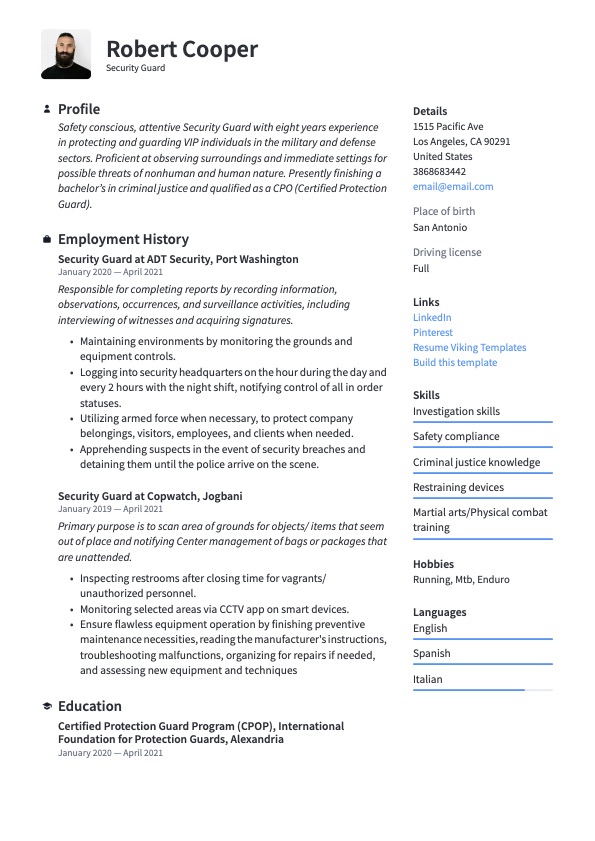
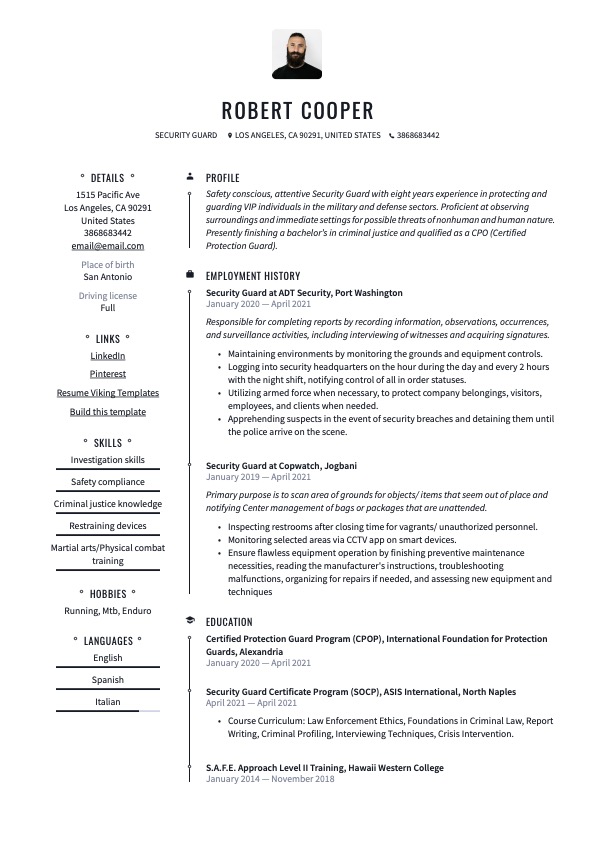
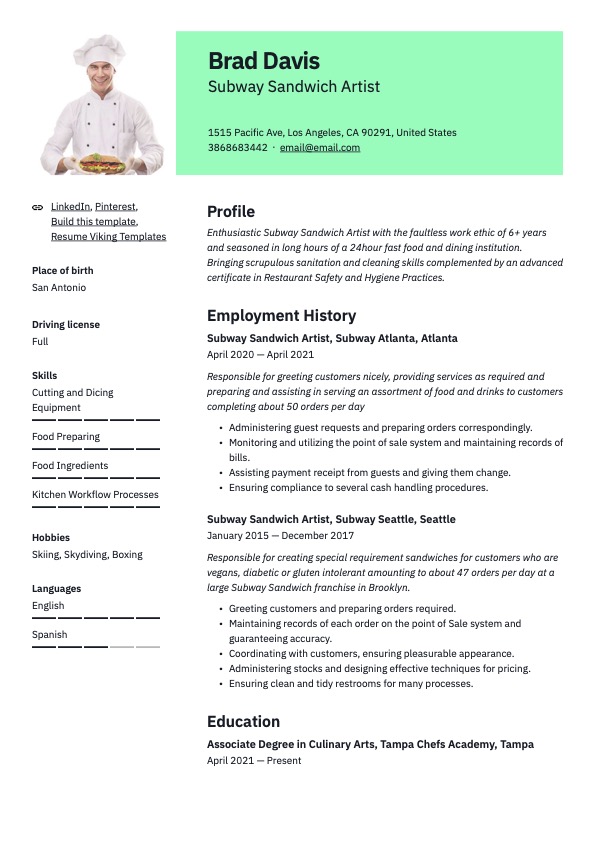
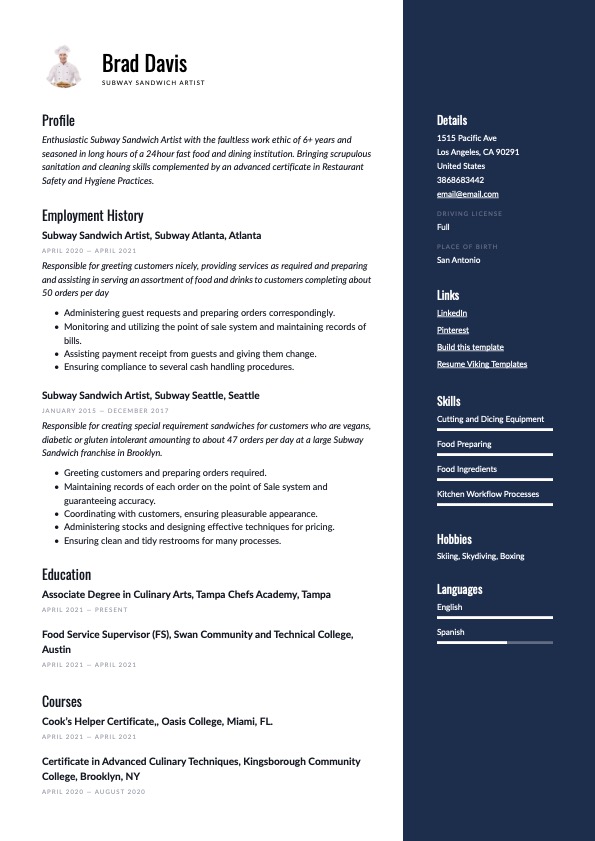
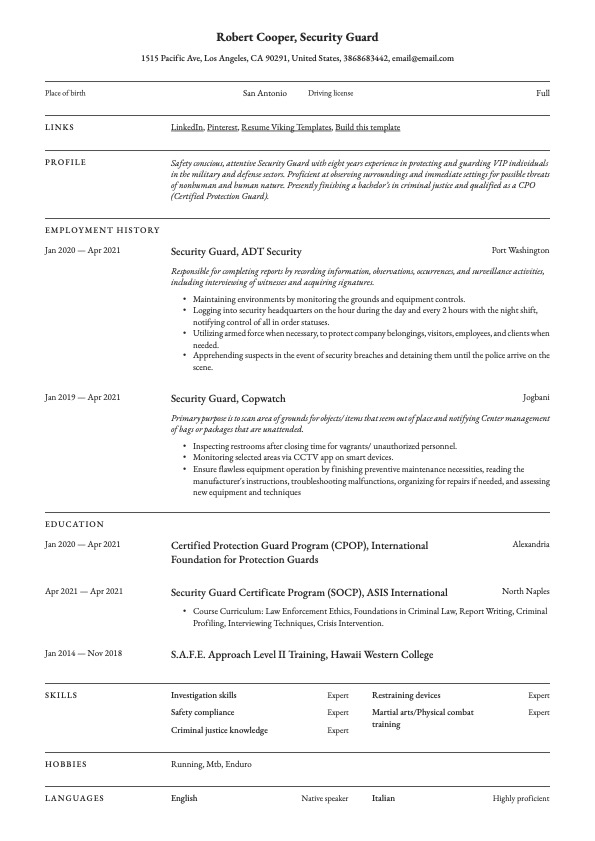
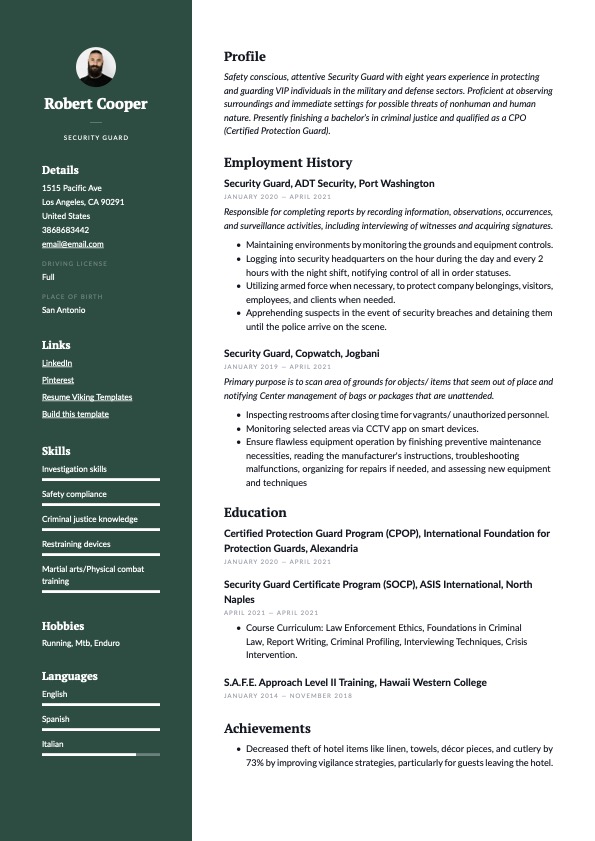
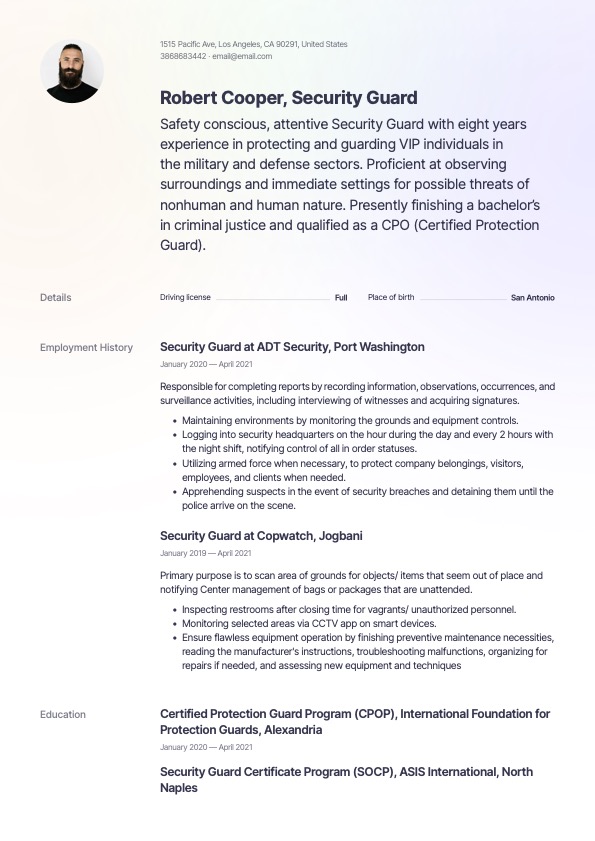
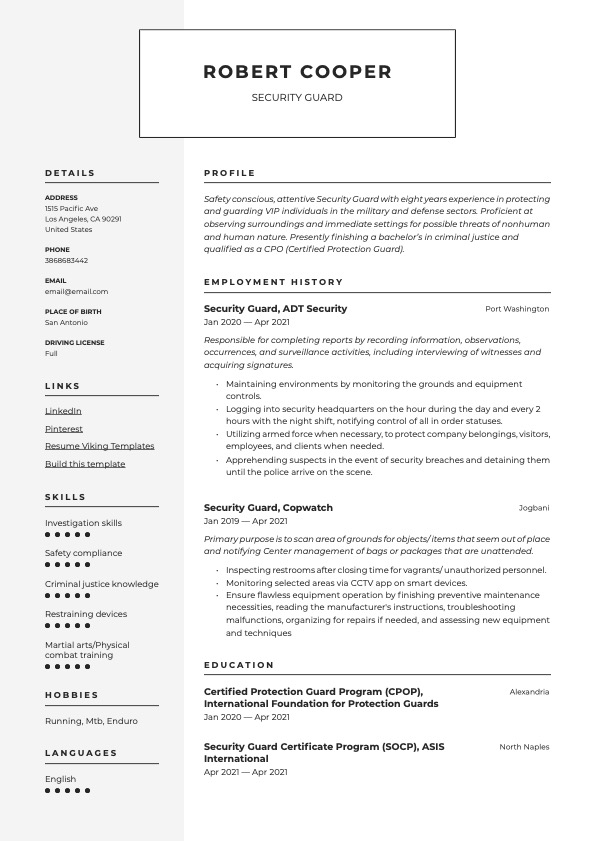
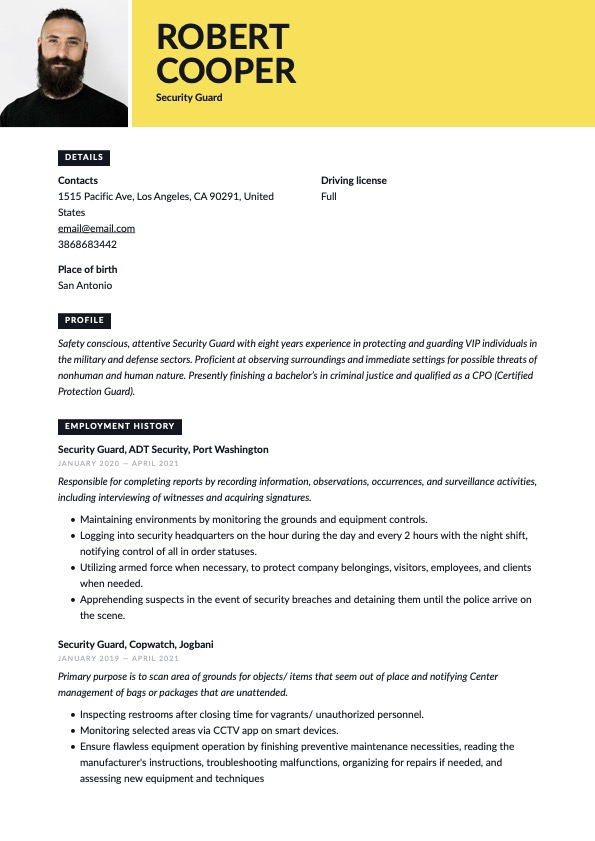
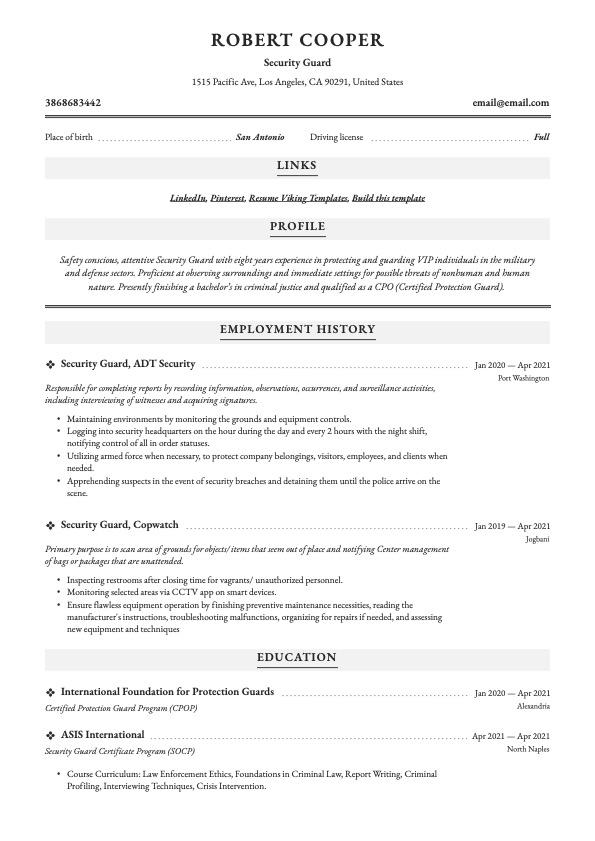
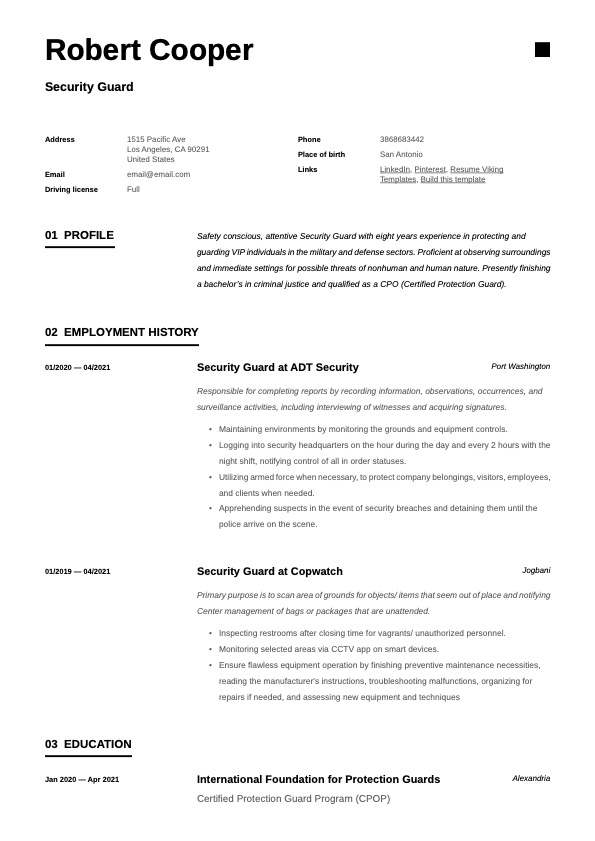
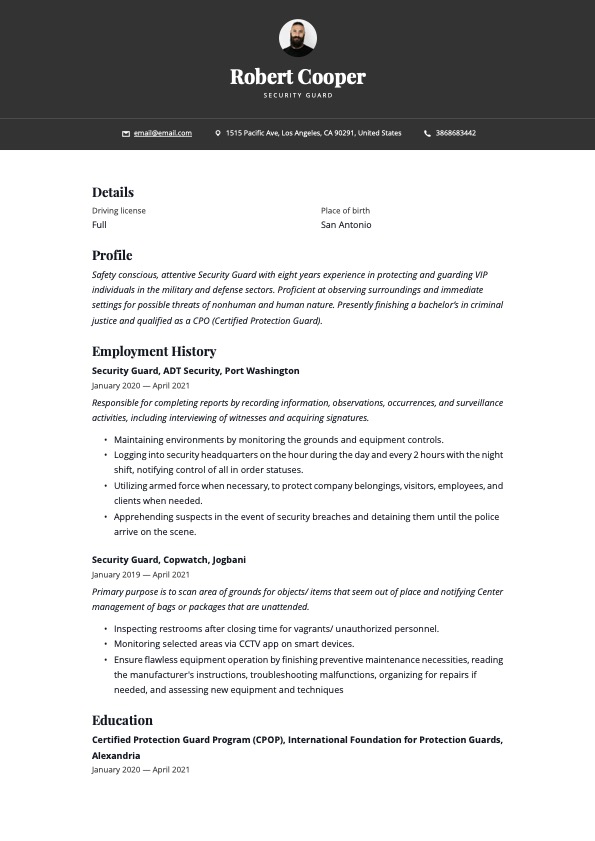
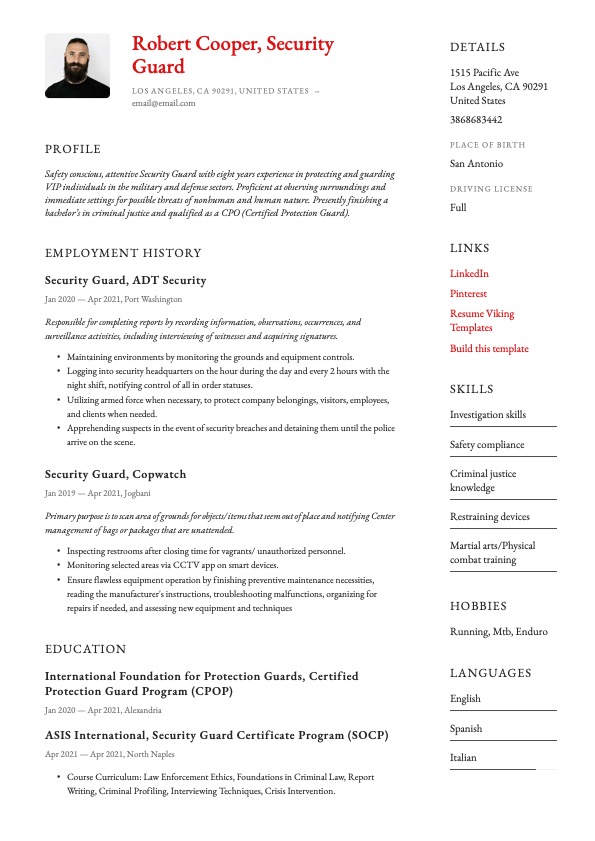
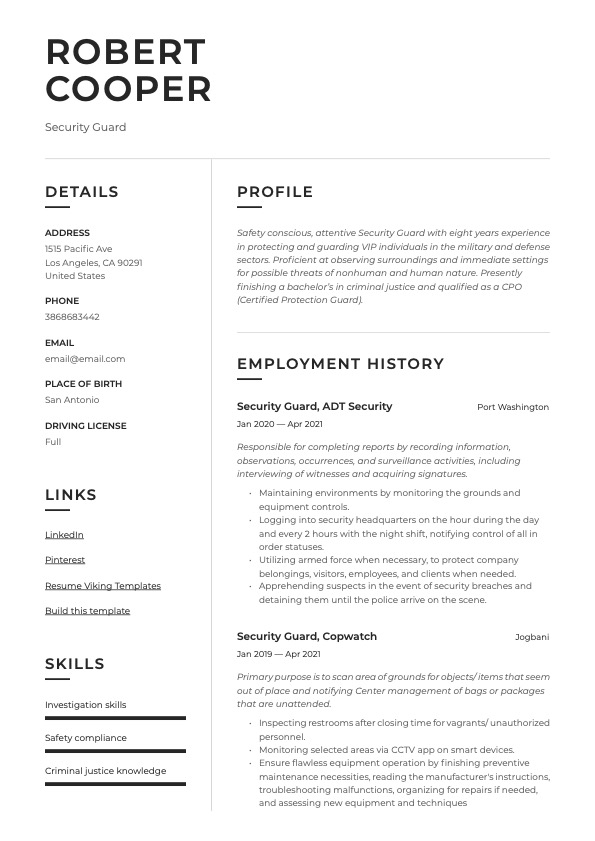
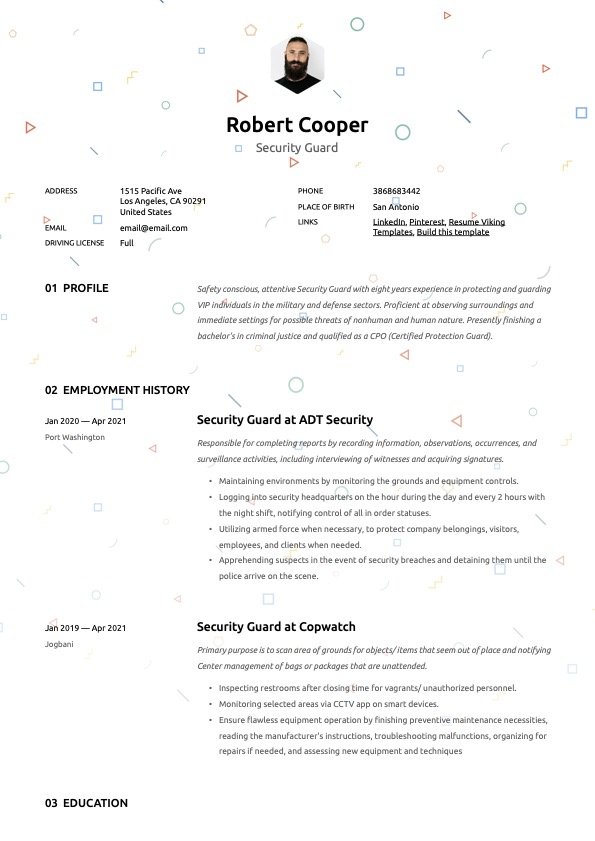
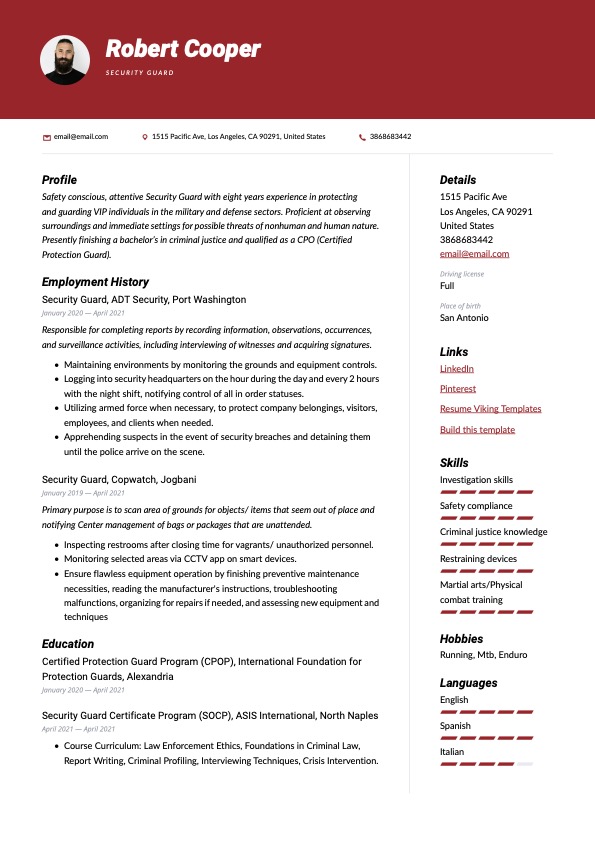
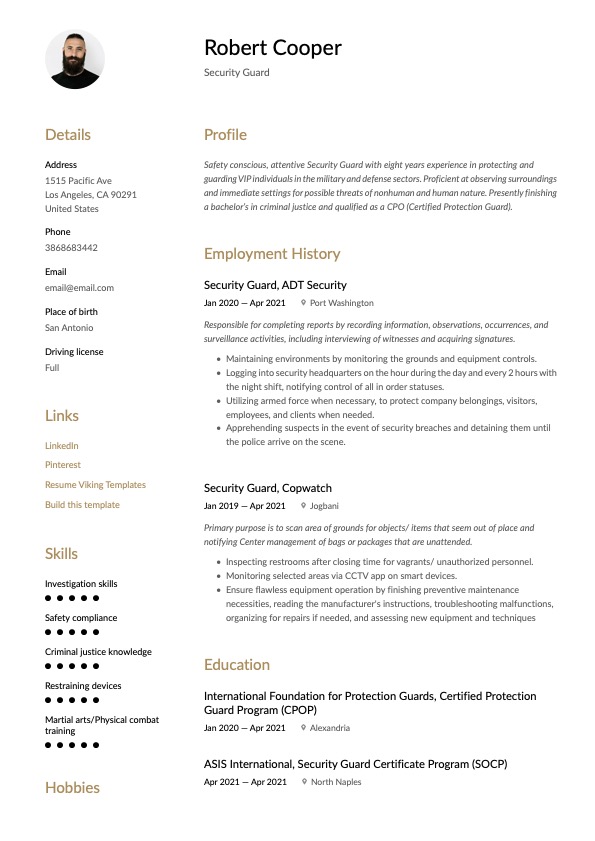
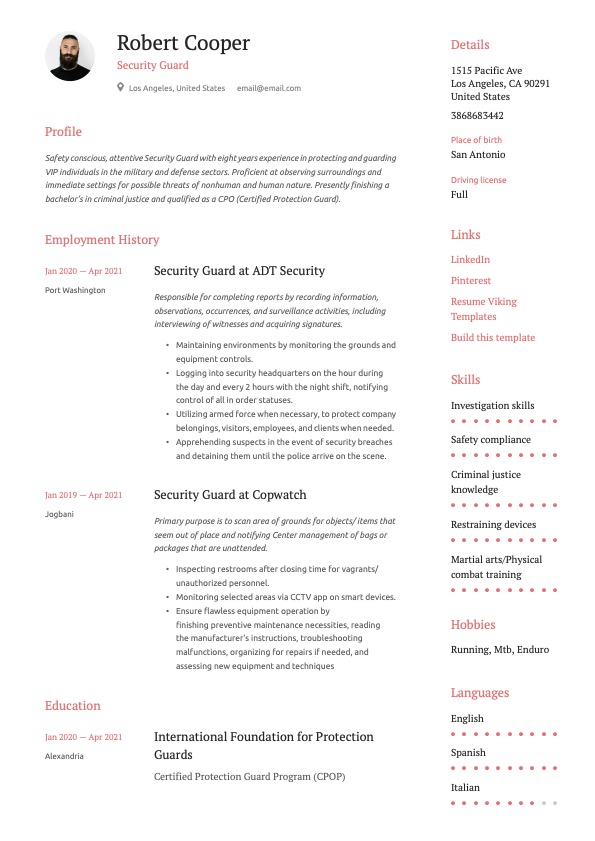
Professional Information for Security Guards
Sectors: Various
Career Type: Guarding, Protecting, Securing, Monitoring, Reacting, Preventing
Person type: Guard, Responder, Server, Guider, Guard
Education levels: High School Diploma to Post School Diplomas
Salary indication: $23K (low), $28K (medium), $37K (high), $78K (specialized) Glassdoor
Labor market: Estimated 6% growth between 2016 – 2026
Organizations: Hospitals, Correctional Institutions, Health Clubs, Schools, Office Parks Shopping Malls, Federal & Government Institutions, Hotels & Resorts, Industrial Facilities, Factories, Research Laboratories
